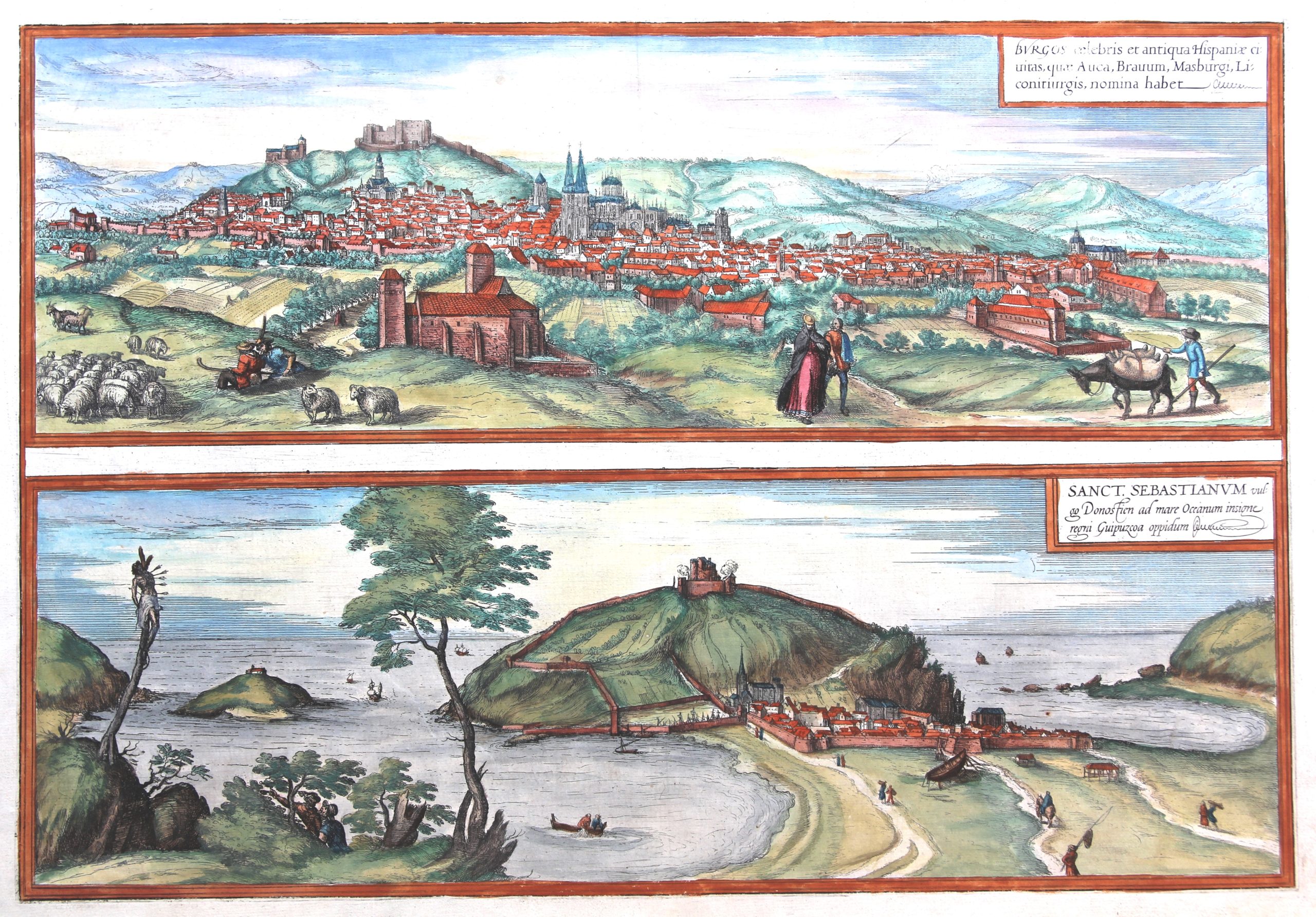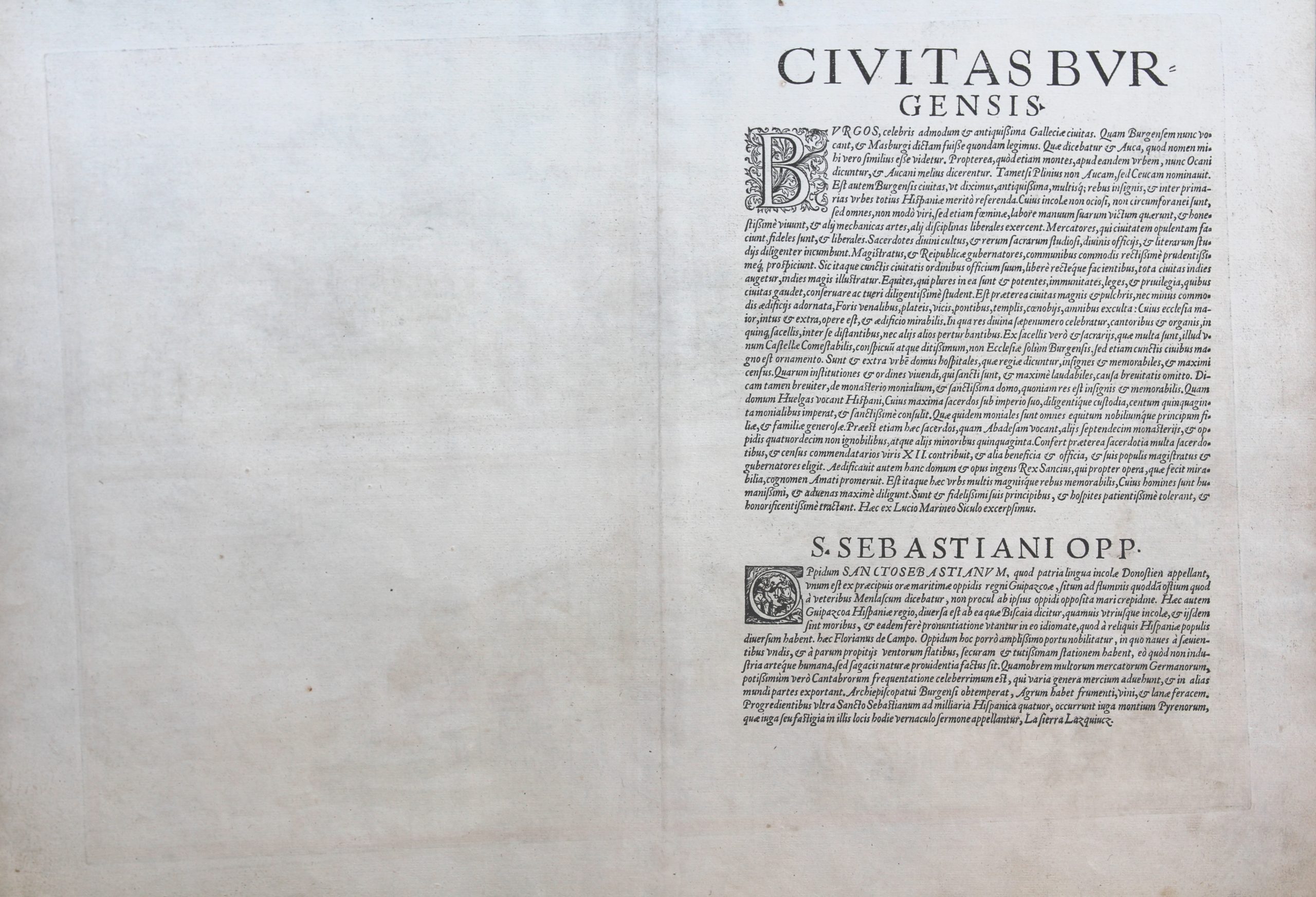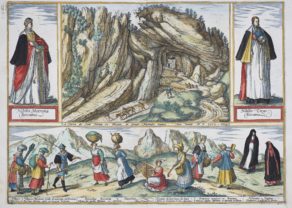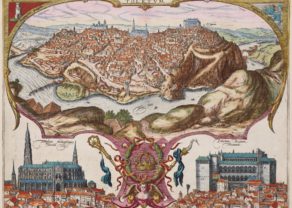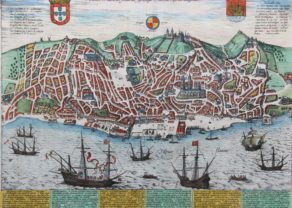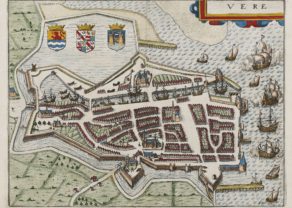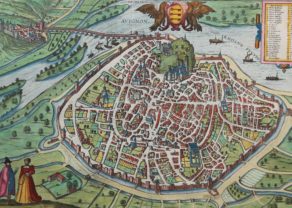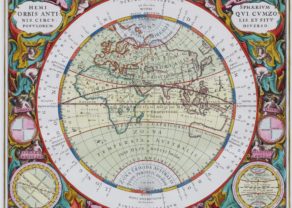Burgos and San Sebastian
Detail
Date of first edition: 1572
Date of this map: 1575
Dimensions (not including margins): 33 x 47 cm
Dimensions (including margins): 49,3 x 54,8 cm
Condition: Very good. Copper engraving on strong paper and wide margins. Centre fold as published. Old colouring.
Condition rating: A+
Verso: text in Latin
From: Theatrum Civitates Terrarum, I; Tasch. Br. Hog., p 52
In stock
Burgos by Braun & Hogenberg
The engraving has probably been made after a drawing by Anton van de Wyngaerde.
Original title: Burgos celebris et antiqua Hispaniae civitas, … (and) Sanct. Sebastianum vulgo Donosien ad Occanum
TRANSLATION OF CARTOUCHE TEXT: Burgos, famous old city in Spain, which also has the names Auca, Pravum Masburgum, Liconitiurgis.
COMMENTARY BY BRAUN: “The inhabitants of this city are no idlers or vagrants, but all, men and women alike, earn their living from the work of their own hands; they are honest folk who devote themselves to handicraft and to the arts. The merchants, who multiply the city’s wealth, are honest and also generous. The largest church is wondrously designed, both inside and out; inside it, divine service is celebrated at Communion, with singers and organs in five different chapels, none disturbing the other.”
Burgos was developed as a stronghold against the Moors from AD 884. In 932 it became the capital of the county and in 1037 of the Kingdom of Castile. Burgos lies like an amphiteatre on a hill on the right bank of the Arlazón. The ruined citadel, the former fortress of the kings of Castile, can be clearly seen in the picture. Rising above the city is the vast Gothic cathedral. The city’s commercial activities centered upon wool, cheese and cloth production, industries to which the artist refers in his staffage. By the time the Civitates orbis terrarum came to be published, Burgos’s situation had taken a turn for the worse and Braun’s text was no longer wholly accurate. In 1565 the city was namely struck by the plague, which claimed the lives of almost half its population, and economic setbacks and migration further weakened the city over a prolonged period. Burgos, or more accurately Vivar 7 km away, is the birthplace of the Spanish national hero El Cid, who distinguished himself in battle against the Moors in the 11th century.
San Sebastian by Braun & Hogenberg
The engraving has been made after a drawing by Georg Hoefnagel.
CARTOUCHE: San Sebastián, commonly known as Donostia, on the Atlantic, important town in the province of Guipúzcoa.
COMMENTARY BY BRAUN: “This town is very famous for its wide harbour, in which ships find a safe anchorage during stormy seas and strong winds. Since it was built not by the hard work and skill of man but by careful hand of Nature, it is well known amongst many German merchants, above all, however, amongst the Cantabrian merchants who transport all sorts of wares here and also export them again. The town also possesses fertile fields for producing grain, wine and wool. The Pyrenees begin four Spanish miles away.”
San Sebastián’s favourable seaside location on the Bay of La Concha (The Shell), in the north of the Iberian Peninsula between Monte Igueldo and Monte Urgull with the small rocky Island on Santa Clara, is clearly illustrated in the engraving. The buildings of the town appear cramped and no details can be identified. It is nevertheless clear that the view shows San Sebastián after its reconstruction; in January 1489 a blaze had namely destroyed almost all the buildings in the town, which had been constructed chiefly of wood. Having been rebuilt, the town subsequently became the base of the Cantabrian armada. On a rocky outcrop on the left-hand edge of the picture is the martyred figure of St Sebastian, from whom the town takes its name. (Taschen)
Related items
-

San Adrian (Navarre) – La Sierra de Sant Adrian en Biscaia
by Georg Braun and Frans HogenbergPrice (without VAT, possibly to be added): €700,00 / $777,00 / £623,00 -

Toledo (Castile) – Toletum
by Georg Braun and Frans HogenbergPrice (without VAT, possibly to be added): €1 500,00 / $1 665,00 / £1 335,00
